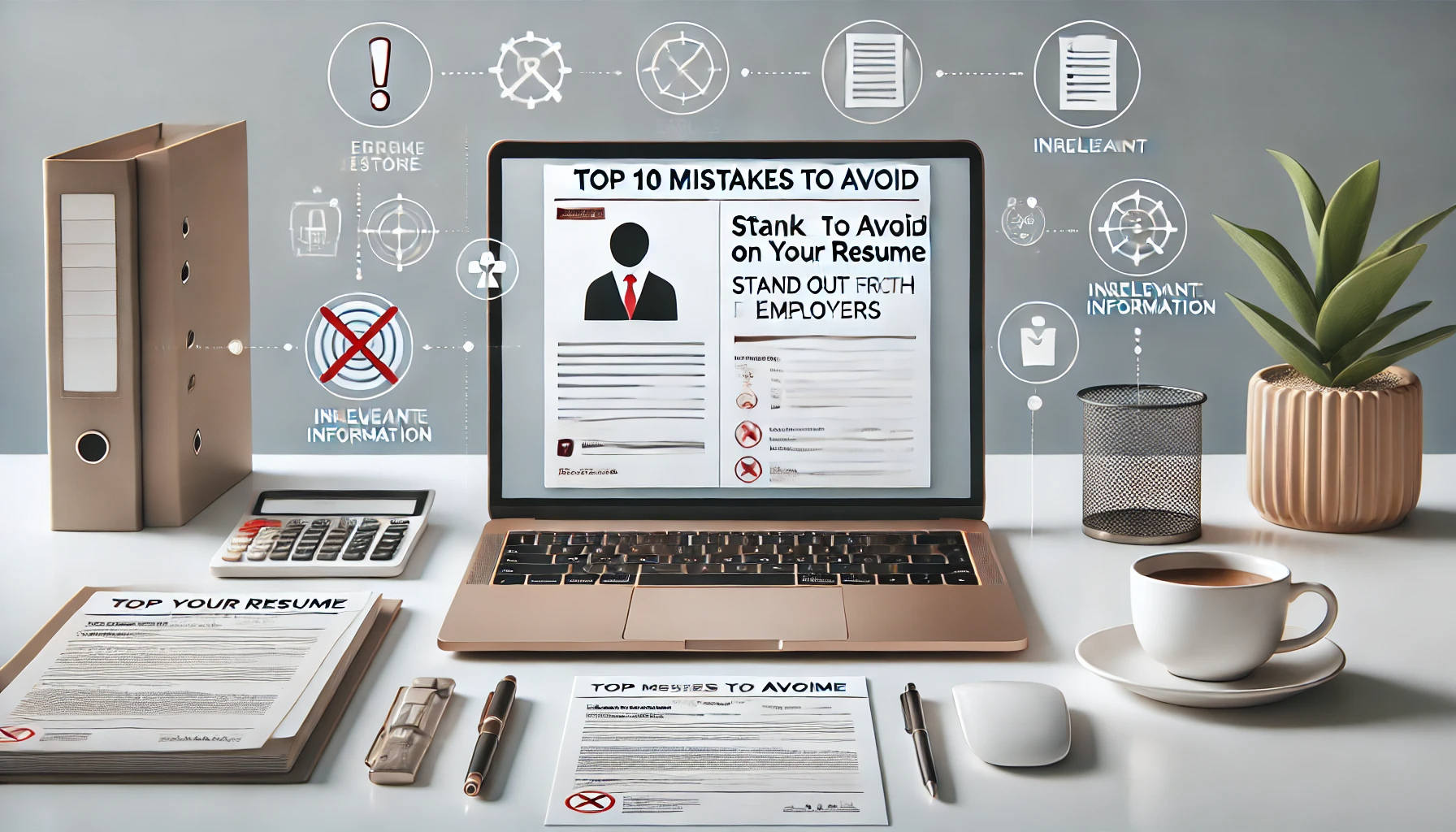Top 10 Mistakes to Avoid on Your Resume: Stand Out to Employers
Your resume is the first impression you make on potential employers, and it can make or break your chances of getting the job you want. Crafting a professional, polished, and compelling resume can be the key to landing your next interview. However, many candidates unknowingly make common mistakes that can lead to missed opportunities. This comprehensive guide will help you avoid those pitfalls and create a resume that stands out to employers.
1. Including Irrelevant Information
Many job seekers make the mistake of including irrelevant personal details or job experiences that don’t align with the role they are applying for. Avoid listing hobbies, interests, or past job experiences unless they are directly related to the job at hand.
Tip: Tailor your resume for each job by emphasizing relevant skills and experiences. Always align your resume with the job description, focusing on what the employer is seeking.
2. Using a Generic Resume Format
A one-size-fits-all approach can weaken your chances of standing out. Sending out the same generic resume to multiple employers signals a lack of attention to detail and effort.
Tip: Customize your resume format and content to fit the role you are applying for. Use industry-specific keywords and emphasize the skills and achievements most relevant to the position.
3. Not Showcasing Achievements
Listing duties and responsibilities is not enough to demonstrate your potential value to a company. Employers want to know how you made a difference in your previous roles.
Tip: Use quantifiable achievements to showcase the impact you made at your previous jobs. For example, "Increased sales by 20% within the first quarter" is more powerful than "Responsible for sales." Numbers and specific examples make your resume more compelling.
4. Ignoring Keywords from the Job Description
Many companies use Applicant Tracking Systems (ATS) to filter resumes before they ever reach human eyes. Failing to include relevant keywords from the job description can prevent your resume from passing through the system.
Tip: Carefully read the job description and incorporate keywords that align with your experience. These might include specific skills, software tools, or certifications.
5. Inconsistent Formatting
An inconsistent resume format with mismatched fonts, bullet styles, or poorly aligned text can make your resume look unprofessional and difficult to read.
Tip: Use a clean, professional layout with consistent formatting. Stick to one or two professional fonts, maintain the same bullet point style throughout, and ensure proper alignment. Consider using a template from reputable resume-building platforms like MyCVCreator.com to simplify the process.
6. Writing a Lengthy Resume
While you may be tempted to include every job experience or project, long resumes can overwhelm hiring managers. They typically spend only a few seconds scanning a resume, so make sure yours is concise and to the point.
Tip: Keep your resume to one page if you have less than 10 years of experience. For seasoned professionals, two pages are acceptable, but only if the content is highly relevant to the role.
7. Neglecting Contact Information
It might seem like an obvious point, but many applicants forget to include updated and correct contact information. Incorrect phone numbers, outdated email addresses, or missing LinkedIn profiles can prevent employers from contacting you.
Tip: Always double-check that your contact details are accurate. Include your name, professional email, phone number, and a link to your LinkedIn profile or online portfolio.
8. Using Clichés and Buzzwords
Phrases like “hard worker,” “team player,” or “go-getter” are vague and overused. They don't tell employers anything specific about your skills or achievements.
Tip: Replace clichés with action-oriented language that demonstrates your accomplishments. For example, instead of “hard worker,” you might say “dedicated professional with a track record of increasing operational efficiency by 15%.”
9. Not Proofreading Thoroughly
Typos, spelling errors, and grammatical mistakes can signal a lack of attention to detail and professionalism. Even one minor error can leave a negative impression on a potential employer.
Tip: Proofread your resume multiple times and consider using a tool like Grammarly to check for errors. It’s also helpful to have someone else review it for you, as a fresh pair of eyes might catch mistakes you’ve missed.
10. Lack of a Clear Career Summary
Your resume needs a clear, concise career summary at the top that highlights your key qualifications, experience, and the value you can bring to a company. Failing to include this can result in a weak first impression.
Tip: Write a short professional summary at the beginning of your resume, emphasizing your key skills, accomplishments, and career goals. Keep it focused on what makes you a strong candidate for the specific role you’re applying for.
Conclusion
Avoiding these common resume mistakes can significantly improve your chances of landing your dream job. A well-crafted resume, free of errors and tailored to the position, will help you stand out to employers and make a lasting impression. Use these tips to refine your resume and ensure it highlights your best qualities, relevant achievements, and attention to detail. For an even more polished look, try using MyCVCreator.com, where professional resume templates and easy-to-use features can help you create a standout resume that gets noticed.









